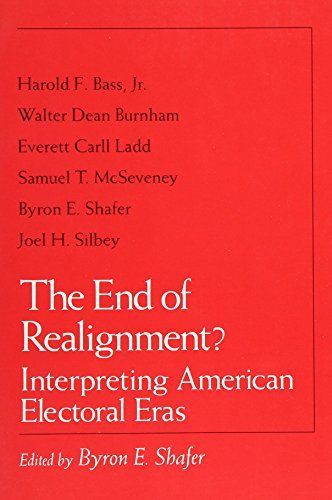
The End of Realignment? Interpreting American Electoral Eras
Electoral realignment, referring originally to a major shift in party preferences within the general public, has been one of the most successful theories in modern social science. Since V. O. Key introduced the theory in his seminal articles in the 1950s, it has been the reigning explanation for patterns of electoral behavior in American history. As a concept, realignment has stimulated considerable scholarly output and permeated journalists’ interpretations of recent elections. Perhaps inevitably, it has also stimulated a great deal of debate. The End of Realignment provides a forum for differing viewpoints in this debate. In these unusually well-integrated, original essays, six distinguished political scientists and historians question whether the theory of realignment can explain electoral developments both of the post-1968 period and of earlier political eras. The essays alternately challenge and defend realignment. Some argue that the central notion, while historically useful, no longer explains contemporary electoral behavior. Others argue that the notion is based on comparatively recent history and has been misused to carve American history into grand political eras. Many in both camps agree that depending heavily on realignment to explain electoral politics obscures other influences at work in elections. Contributors are Byron E. Shafer, Joel H. Silbey, Everett Carl Ladd, Samuel T. McSeveney, Walter Dean Burnham, and Harold F. Bass, Jr. The provocative essay by volume editor Shafer offers an alternative explanation for the pattern of electoral outcomes that have characterized American politics since the late 1960s. Bass’s guide to the literature informing this debate and his comprehensive bibliography of literature on realignment and its alternatives contribute to making this an indispensable volume for anyone studying American electoral history. “A book that provides, as Shafer’s does, a skillfully constructed challenge to the reigning orthodoxy, and alternative explanation for electoral patterns since 1968, and an informed defense of realignment is a volume of unusual importance.”—John F. Bibby, University of Wisconsin–Milwaukee “Of the various writers under review, Byron E. Shafer in his essay ‘The Notion of an Electoral Order,’ included in The End of Realignment?, comes closest to providing an explanation of the liberal dilemma: the failure of liberal Democrats to regain the presidency.”—Thomas Byrne Edsall, The New York Review of Books “[A] gem of a book, a must for every political scientist and student of the American party system.”—Choice